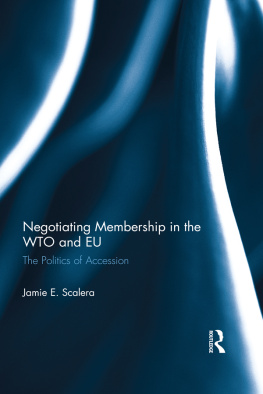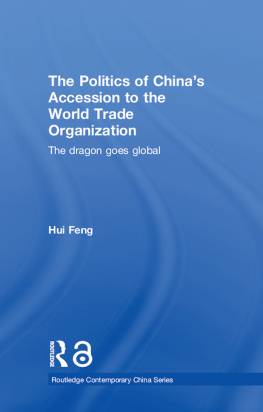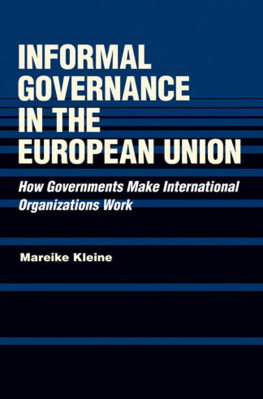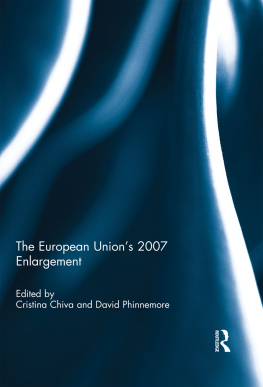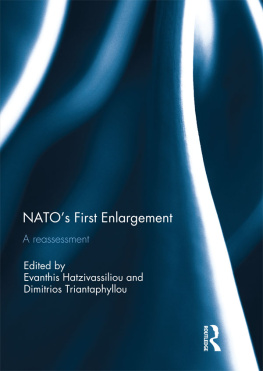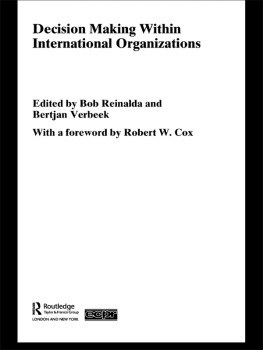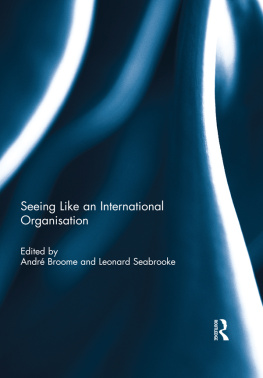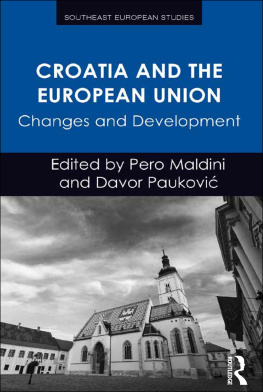Negotiating Membership in the WTO and the EU
With the accession of Afganistan in 2016, the World Trade Organization (WTO) numbered 164 members with 19 other states in line to join. The WTO is certainly not alone in its growth though; the Organization for Economic Cooperation and Develop ment (OECD), the North Atlantic Treaty Organization (NATO), and the European Union (EU) are all expanding with dozens of states continuing to negotiate their potential membership. What impact does membership in inter -national organizations really have? Why do some enjoy a seemingly easy path to joining international organizations while others find the process nearly impossible? What implications do these difficult accession processes have on the domestic and international politics of the acceding states? The author presents the two-level theory of accession, which highlights factors at the domestic level and international organization level, to explain how accession processes in the WTO and EU vary from state to state and the impact of these variations. In so doing, this book provides a unique perspective on the topic of membership in international organizations.
Dr Jamie Elizabeth Scalera is an Assistant Professor in the Department of Politi -cal Science and International Studies at Georgia Southern University. She received her PhD in Political Science from the University of Illinois at Urbana-Champaign in 2012. She holds an MA from the University of Florida and a BA from Stetson University. Dr Scalera teaches and researches in the field of Inter national Relations, with a focus on international organizations and international political economy. Dr Scaleras research has been presented at annual conferences for organizations such as the American Political Science Association, the International Studies Association, and the European Union Studies Association. Dr Scaleras research has been published in International Organization, European Politics and Society, and Papers & Publications: Interdisciplinary Journal of Undergraduate Research.
First published 2017
by Routledge
2 Park Square, Milton Park, Abingdon, Oxon OX14 4RN
and by Routledge
711 Third Avenue, New York, NY 10017
Routledge is an imprint of the Taylor & Francis Group, an informa business
2017 Jamie E. Scalera
The right of Jamie E. Scalera to be identified as author of this work has been asserted by her in accordance with sections 77 and 78 of the Copyright, Designs and Patents Act 1988.
All rights reserved. No part of this book may be reprinted or reproduced or utilized in any form or by any electronic, mechanical, or other means, now known or hereafter invented, including photocopying and recording, or in any information storage or retrieval system, without permission in writing from the publishers.
Trademark notice: Product or corporate names may be trademarks or registered trademarks, and are used only for identification and explanation without intent to infringe.
British Library Cataloguing in Publication Data
A catalogue record for this book is available from the British Library
Library of Congress Cataloging in Publication Data
Names: Scalera, Jamie E., author.
Title: Negotiating membership in the WTO and the EU : the politics of
accession / Jamie E. Scalera.
Description: Abingdon, Oxon ; New York, NY : Routledge, 2017. |
Includes bibliographical references and index.
Identifiers: LCCN 2016040344| ISBN 9781472488572 (hbk) |
ISBN 9781315228648 (ebk)
Subjects: LCSH: International agenciesMembership. | International
agenciesMembershipCase studies. | World Trade Organization
Membership. | European UnionMembership.
Classification: LCC JZ4850 .S324 2017 | DDC 341.242/23dc23
LC record available at https://lccn.loc.gov/2016040344
ISBN: 978-1-472-48857-2 (hbk)
ISBN: 978-1-315-22864-8 (ebk)
Typeset in Times New Roman
by Florence Production Ltd, Stoodleigh, Devon, UK
For my parents, Joel and Donna,
who gave me roots and wings
Maps
0.1 Member Countries of the WTO, August 2016
0.2 Member Countries of the EU, August 2016
Tables
This book is about the transformative process that states undergo as they join international organizations. In Spring 2003, I saw firsthand how international organizations forever change states. I was an undergraduate student from Stetson University studying abroad in Madrid right after the euro had replaced the peseta as Spains currency. Everywhere I went, I saw signs advertising prices in both euros and pesetas. My host mother spent many nights at the kitchen table discussing this transition with mehow it impacted her shopping, her investments, and especially her identity. Before I returned home, she gave me a 100-peseta-coin she had refused to turn over (as she phrased it) in exchange for euros. As I held that coin in my hand, I realized how far reaching the European Union had become and that this institution could change not just laws and policies, but also real peoples lives.
In the years since my time in Madrid, these questions have followed me through out my education and early career. Consequently, many people have read this work, or portions of this work, and I owe them all a debt of gratitude. At the University of Illinois, I was fortunate to be surrounded by so many excellent researchers whose mentorship on the early versions of this project made a lasting impression. Special thanks go to the many professors, colleagues, and friends who read countless drafts of my early work on this subject. Funding for the early versions of this project was also generously provided by the Cline Center for Democracy and the College of Liberal Arts and Sciences. I am also grateful to initiatives like Journeys in World Politics and Pay It Forward where I received feedback on this project and encouragement from amazing women who have done so much to create a path for young scholars like myself.
In my early career, I have also been blessed with supportive colleagues at Georgia Southern University where I spent a great deal of time and effort updating this work. In particular, I have to thank my current and former colleagues in the Department of Political Science and International Studies for their support of this project. Thank you to those who helped me with the proposal, read drafts of chapters, listened to presentations on this research, and especially to those who were in the trenches writing alongside me. I also thank my friends and fellow writers at the CT2 Faculty Writers Boot Camp where much of this project was completed. I received financial support for completing this project through various initiatives put forward by Dean Curtis Ricker in the College of Liberal Arts and Social Sciences; I thank him for his generous support. I also benefitted from excellent research assistance from the following undergraduate students: Brittany Bullock, Melissa Dixon, Nia Hill, Stephen Pelosi, Morgan Podczervinski, and Caitlin Robertson. Thank you for your hard work and interest in this project.
Several others deserve thanks for their assistance with my research. I thank the staff at the Historical Archives of the European Union at the European University Institute in Florence, Italy for their help on this project. I am also indebted to all the individuals in Brussels, Belgium who agreed to be interviewed for this project. I hope I treated your words with respect, and I thank you for allowing me to tell a part of your story. Last, but certainly not least, I thank my commissioning editor, Rob Sorsby, for his enthusiastic support of the project.

